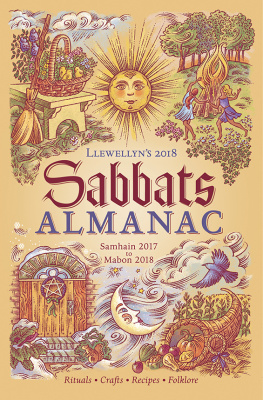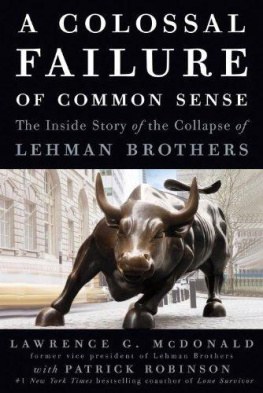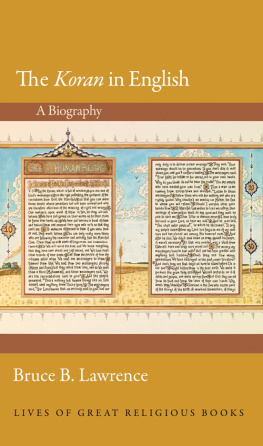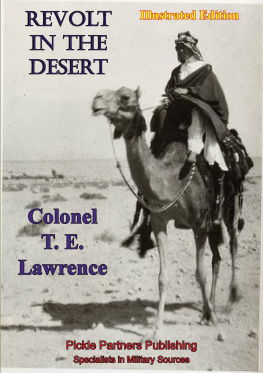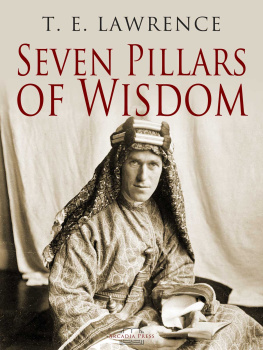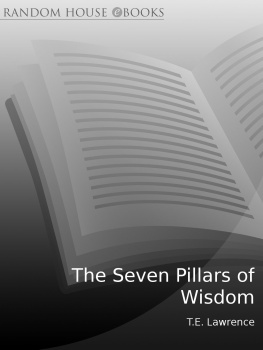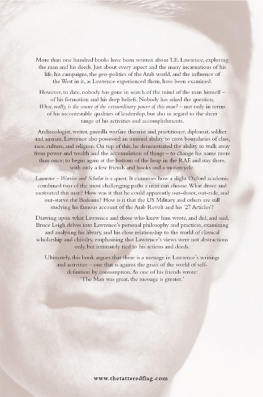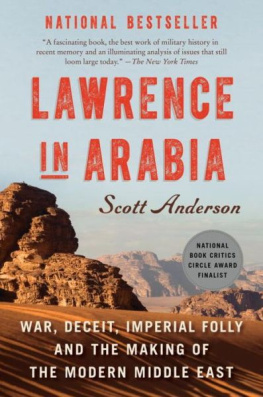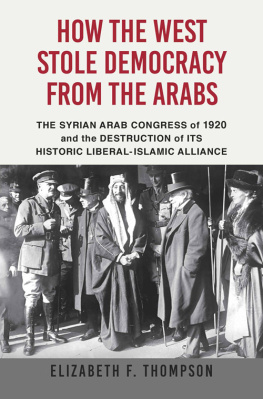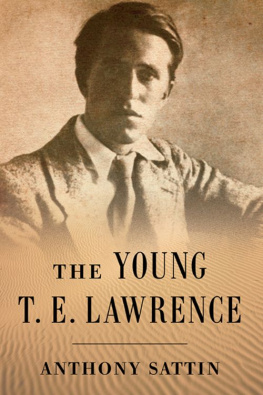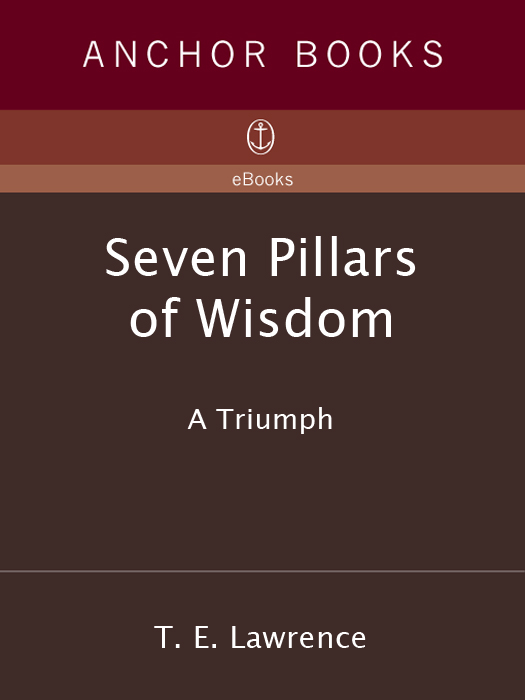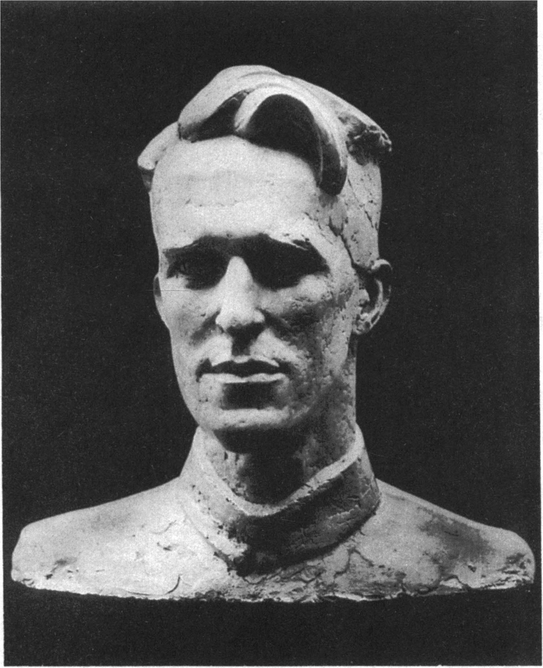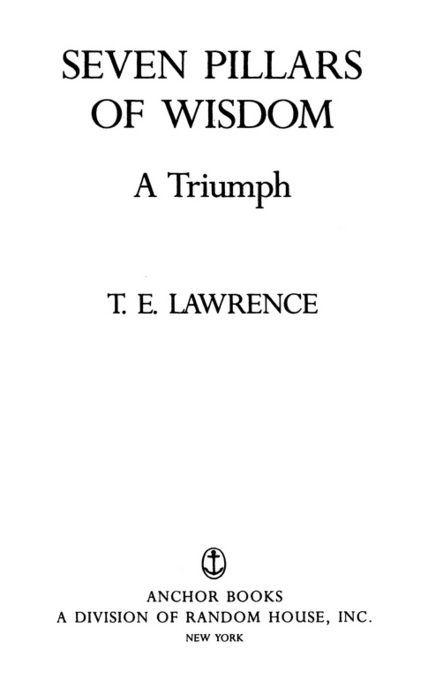F IRST A NCHOR B OOKS E DITION , J ULY 1991
Copyright 1926, 1935 by Doubleday, a division of Random House LLC.
All rights reserved under International and Pan-American Copyright Conventions. Published in the United States by Anchor Books, a division of Random House LLC., New York. Seven Pillars of Wisdom was originally published in a private edition by the George Doran Publishing Company in 1926. It was first published in the United States for general circulation by Doubleday, Doran & Company in 1935. The Anchor Books edition is published by arrangement with Doubleday, a division of Random House LLC.
A Penguin Random House Company
eBook ISBN: 978-0-804-1708-2-6
Trade Paperback ISBN: 978-0-385-41895-9
Library of Congress Cataloging-in-Publication Data
Lawrence, T. E. (Thomas Edward), 18881935.
Seven pillars of wisdom: a triumph / T. E. Lawrence.
p. cm.
Originally published as a private edition by the George Doran Publishing Company in 1926T.p. verso.
Includes indexes.
1. Lawrence, T. E. (Thomas Edward), 18881935.
2. World War, 19141918CampaignsArabian Peninsula.
3. World War, 19141918Personal narratives, British.
4. ArabsHistory20th century. 5. BedouinsHistory20th century. 6. WahhbyahSaudi Arabia. 7. Arabian PeninsulaSocial life and customs. I. Title.
D568.4.L4 1991 9021449
940.415dc20 CIP
ISBN 0-385-41895-7
www.anchorbooks.com
v3.1
To S.A.
I loved you, so I drew these tides of men into my hands
and wrote my will across the sky in stars
To earn you Freedom, the seven pillared worthy house,
that your eyes might be shining for me
When we came.
Death seemed my servant on the road, till we were near
and saw you waiting:
When you smiled, and in sorrowful envy he outran me
and took you apart:
Into his quietness.
Love, the way-weary, groped to your body, our brief wage
ours for the moment
Before earths soft hand explored your shape, and the blind
worms grew fat upon
Your substance.
Men prayed me that I set our work, the inviolate house,
as a memory of you.
But for fit monument I shattered it, unfinished: and now
The little things creep out to patch themselves hovels
in the marred shadow
Of your gift.
AUTHORS PREFACE
Mr. Geoffrey Dawson persuaded All Souls College to give me leisure, in 19191920, to write about the Arab Revolt. Sir Herbert Baker let me live and work in his Westminster houses.
The book so written passed in 1921 into proof: where it was fortunate in the friends who criticized it. Particularly it owes its thanks to Mr. and Mrs. Bernard Shaw for countless suggestions of great value and diversity: and for all the present semicolons.
It does not pretend to be impartial. I was fighting for my hand, upon my own midden. Please take it as a personal narrative pieced out of memory. I could not make proper notes: indeed it would have been a breach of my duty to the Arabs if I had picked such flowers while they fought. My superior officers, Wilson, Joyce, Dawnay, Newcombe and Davenport could each tell a like tale. The same is true of Stirling, Young, Lloyd and Maynard: of Buxton and Winterton: of Ross, Stent and Siddons: of Peake, Hornby, Scott-Higgins and Garland: of Wordie, Bennett and MacIndoe: of Bassett, Scott, Goslett, Wood and Gray: of Hinde, Spence and Bright: of Brodie and Pascoe, Gilman and Grisenthwaite, Greenhill, Dowsett and Wade: of Henderson, Leeson, Makins and Nunan.
And there were many other leaders or lonely fighters to whom this self-regardant picture is not fair. It is still less fair, of course, like all war-stories, to the un-named rank and file: who miss their share of credit, as they must do, until they can write the despatches.
T. E. S.
Cranwell, 15.8.26
CONTENTS
SYNOPSIS
H ALF-WAY through the labour of an index to this book I recalled the practice of my ten years study of history; and realized I had never used the index of a book fit to read. Who would insult his Decline and Fall, by consulting it just upon a specific point?
I am aware that my achievement as a writer falls short of every conception of the readable: but surely not so far as to make it my duty, like a Stubbs, to save readers the pain of an unnecessary page. The contents seem to me adequately finger-posted by this synopsis.
INTRODUCTION
THE FOUNDATIONS OF ARAB REVOLT
Some Englishmen, of whom Kitchener was chief, believed that a rebellion of Arabs against Turks would enable England, while fighting Germany, simultaneously to defeat her ally Turkey. Their knowledge of the nature and power and country of the Arabic-speaking peoples made them think that the issue of such a rebellion would be happy: and indicated its character and method. So they allowed it to begin, having obtained formal assurances of help for it from the British Government. Yet none the less the rebellion of the Sherif of Mecca came to most as a surprise, and found the Allies unready. It aroused mixed feelings and made strong friends and enemies, amid whose clashing jealousies its affairs began to miscarry.
).
).
).
).
).
).
).
BOOK I
MY FIRST VISIT TO ARABIA
I had believed these misfortunes of the Revolt to be due to faulty leadership, or rather to the lack of leadership, Arab and English. So I went down to Arabia to see and consider its great men. The first, the Sherif of Mecca, we knew to be aged. I found Abdulla too clever, Ali too clean, Zeid too cool. Then I rode up-country to Feisal, and found in him the leader with the necessary fire, and yet with reason to give effect to our science. His tribesmen seemed sufficient instrument, and his hills to provide natural advantage. So I returned confidently to Egypt, and told my chiefs how Mecca was defended not by Rabegh, but by Feisal in Jebel Subh.
).
).
).
).
).
).
).
).
).
BOOK II
FEISALS FIRST EXTENSION NORTHWARD
My chiefs were astonished at such favourable news, but promised help, and meanwhile sent me back, much against my will, into Arabia. I reached Feisals camp on the day the Turks carried the defences of Jebel Subh. By their so doing the entire basis of my confidence in a tribal war was destroyed. We havered for a while by Yenbo, hoping to retrieve the position: but the tribesmen proved to be useless for assault, and we saw that if the Revolt was to endure we must invent a new plan of campaign at once. This was hazardous, as the promised British military experts had not yet arrived. However, we decided that to regain the initiative we must ignore the main body of the enemy, and concentrate far off on his railway flank. The first step towards this was to move our base to Wejh: which we proceeded to do in the grand manner.
) Yenbo (n6).
).
).
).
).
).
).
).
).
).
).
BOOK III
CONCENTRATING AGAINST THE MEDINA RAILWAY
Our taking Wejh had the wished effect upon the Turks, who abandoned their advance towards Mecca for a passive defence of Medina and its Railway. Our experts made plans for attacking them. The Germans saw the danger of envelopment, and persuaded Enver to order the instant evacuation of Medina. Sir Archibald Murray begged us to put in such a sustained attack as should destroy the retreating enemy. Feisal was soon ready in his part; and I went off to Abdulla to get his co-operation. On the way I fell sick and while lying alone with empty hands was driven to think about the campaign. Thinking convinced me that recent practice had been better than our theory. So on recovery I did little to the Railway, but went back to Wejh with novel ideas. I tried to make the others admit them, and adopt deployment as our ruling principle; and to put preaching even before fighting. They preferred the limited and direct military objective of Medina. So I decided to slip off to Akaba by myself on test of my own theory.


